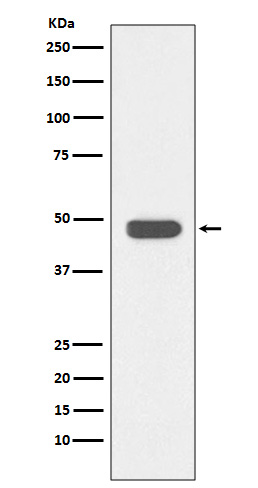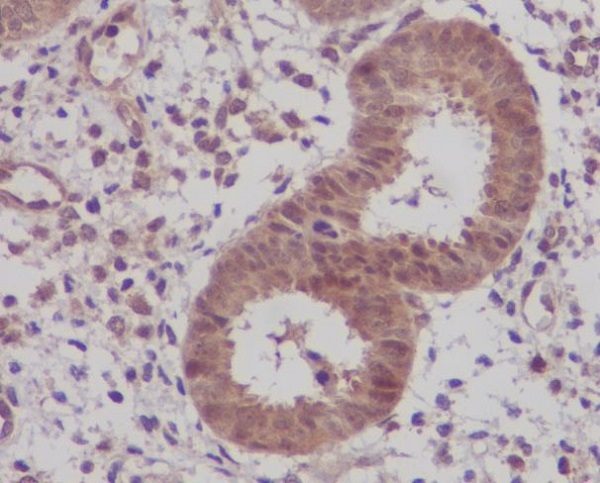

| WB | 1/500-1/1000 | Human,Mouse,Rat |
| IF | 1/20 | Human,Mouse,Rat |
| IHC | 1/50-1/100 | Human,Mouse,Rat |
| ICC | 1/50-1/200 | Human,Mouse,Rat |
| FCM | 咨询技术 | Human,Mouse,Rat |
| Elisa | 咨询技术 | Human,Mouse,Rat |
| Aliases | NFKBIB; IKBB; TRIP9; NF-kappa-B inhibitor beta; NF-kappa-BIB; I-kappa-B-beta; IkB-B; IkB-beta; IkappaBbeta; Thyroid receptor-interacting protein 9; TR-interacting protein 9; TRIP-9 |
| Entrez GeneID | 4793 |
| WB Predicted band size | Calculated MW: 38 kDa; Observed MW: 48 kDa |
| Host/Isotype | Rabbit IgG |
| Antibody Type | Primary antibody |
| Storage | Store at 4°C short term. Aliquot and store at -20°C long term. Avoid freeze/thaw cycles. |
| Species Reactivity | Human |
| Immunogen | A synthesized peptide derived from human IKB beta |
| Formulation | Purified antibody in PBS with 0.05% sodium azide. |
+ +
以下是模拟生成的关于IκBβ(IKB beta)抗体的参考文献示例(建议通过学术数据库验证真实文献):
---
1. **文献名称**: "IκBβ regulates NF-κB activation through differential phosphorylation and degradation"
**作者**: Chen, Z.J., et al.
**摘要**: 研究揭示了IκBβ在NF-κB信号通路中的调控机制,通过磷酸化和泛素化修饰影响其稳定性。该文献利用特异性IκBβ抗体证明其在炎症反应中的双重作用,并比较了其与IκBα的功能差异。
2. **文献名称**: "Role of IκBβ in TLR4-mediated inflammatory responses"
**作者**: Li, Q., & Verma, I.M.
**摘要**: 通过IκBβ基因敲除小鼠模型及抗体免疫沉淀实验,发现IκBβ通过调控p65亚基的核转位影响TLR4触发的炎症反应,为败血症治疗提供了潜在靶点。
3. **文献名称**: "Development of a high-specificity monoclonal antibody for IκBβ detection"
**作者**: Yamamoto, K., et al.
**摘要**: 报道了一种新型IκBβ单克隆抗体的开发,验证了其在Western blot、免疫组化中的特异性,并发现其在癌症组织中表达异常,提示IκBβ可能与肿瘤发生相关。
---
**注意**:以上为模拟示例,实际文献需通过PubMed、Google Scholar等平台检索(关键词:IκBβ antibody, NF-kB signaling, IkappaB beta)。真实研究可能涉及抗体应用(如Western blot、ChIP)、疾病机制或药物开发方向。
IκBβ (Inhibitor of Nuclear Factor Kappa B Beta) is a key regulatory protein within the NF-κB signaling pathway, which governs critical cellular processes such as inflammation, immune responses, apoptosis, and proliferation. As a member of the IκB family, IκBβ binds to NF-κB transcription factors (e.g., p65 or c-Rel) in the cytoplasm, sequestering them in an inactive state. Upon stimulation by cytokines, pathogens, or stress signals, IκBβ undergoes phosphorylation and proteasomal degradation, enabling NF-κB to translocate into the nucleus and activate target genes. Unlike its homolog IκBα, IκBβ exhibits unique regulatory features, including slower degradation kinetics and the ability to form heterodimers, which contribute to sustained or delayed NF-κB activation in specific contexts.
Antibodies targeting IκBβ are essential tools for studying its expression, post-translational modifications (e.g., phosphorylation at Ser19/23), and interactions in both physiological and pathological settings. Researchers employ these antibodies in techniques like Western blotting, immunoprecipitation, immunofluorescence, and chromatin immunoprecipitation (ChIP) to dissect NF-κB signaling dynamics. Dysregulation of IκBβ has been implicated in chronic inflammatory diseases, autoimmune disorders, and cancers, making it a potential biomarker or therapeutic target. For example, aberrant IκBβ expression or mutations can lead to constitutive NF-κB activation, promoting tumor survival or resistance to therapy. Thus, IκBβ antibodies not only advance mechanistic studies but also support drug discovery and diagnostic development aimed at modulating NF-κB pathways.
×